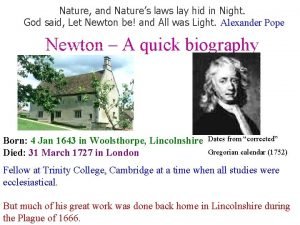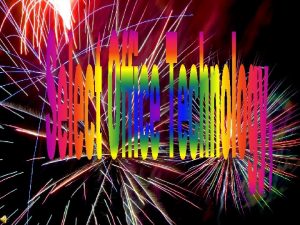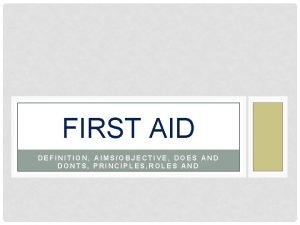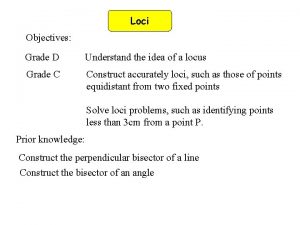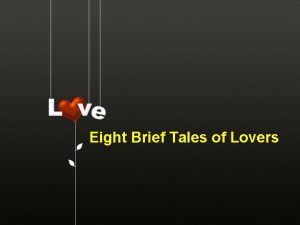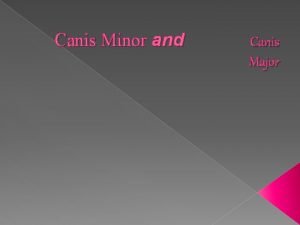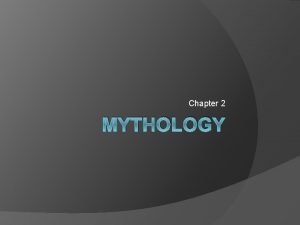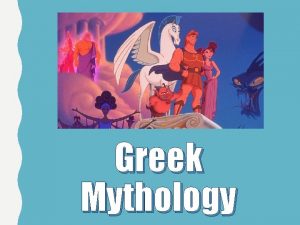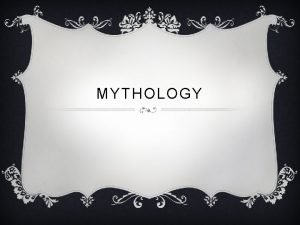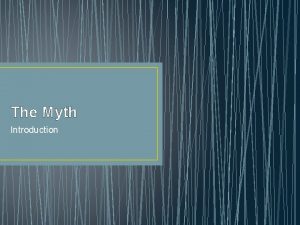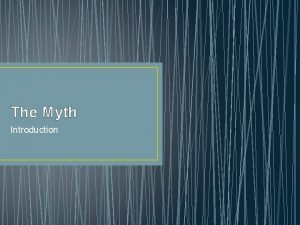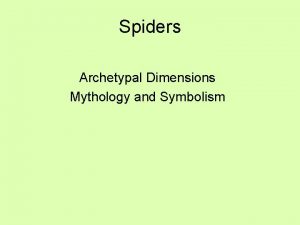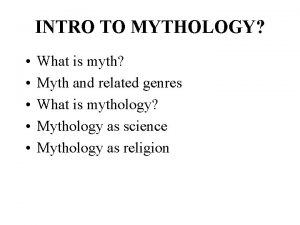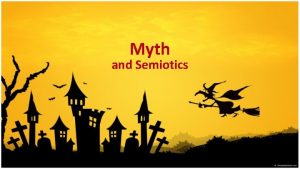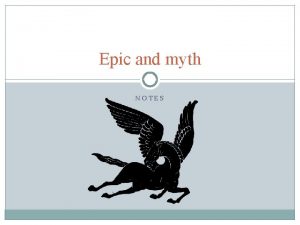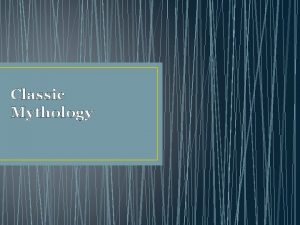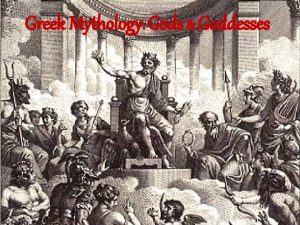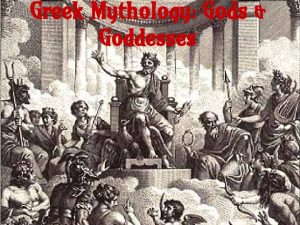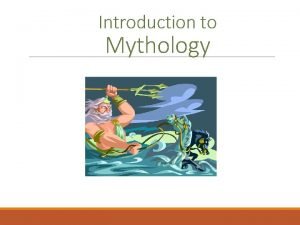Nature of Myth What is Myth Mythology allows


























- Slides: 26

Nature of Myth

What is Myth? • Mythology allows you to take a journey into an exciting and mysterious world. • In our travels we will encounter gods, heroes, monsters, exotic places occasionally, eat popcorn! • For pure story value, myth has no match • Enriches your understanding of literary and artistic works through the ages

What is Myth • You will see that you have entered a living tradition as we continue to incorporate mythological themes into our culture today. – The very stories have overtones of meaning – Achilles – Helen – Hercules – Ulysses – Daedalus – Medea

Multitude of Genres • All of these areas are rich in myth and the stories themselves transcend time in each one • Poetry • Drama • Novelist • Film • Sculpture • Mosaic • Canvas

Levels of Meaning in Myth • We will not be satisfied to tell and retell these stories for their own sake • But we will consider what their meaning in their own time, in ages past, and the present. • What message dot they convey about the people who created them? Did they know they were timeless?

Myth as Story • I. Myths are stories, legends, folklore. • In every culture, from time immemorial people have told stories – a. Of these, perhaps the most captivating have been sacred stores handed down as part of ‘religion’ – b. Narratives that explain and define the acts of nations and rulers – c. Usually these accounts are so old that their origins are shrouded in mystery

Myth as Sacred Story • D. For us, part of their appeal is their evocation some lost era in which members of the communities lives were guided by the stories they held sacred.

Myth Entertainment as Education • As Northrop Frye puts it “the stories of mythology are charged with a special seriousness and importance” – Consider for example: Prometheus • Storytellers made their living as a teacher of sorts. • Even secular tales included values and perspectives that enlighten the audience.

Myth Fact or Fiction? • Many consider myth as false stories told by primitive people to explain the nature of the universe before scientific explanations entered the scene • BUT we must consider that their purpose was NOT scientific but to integrate human nature, nature around them, the cosmos and the very investigation of death! • As students of myth we will see that mythological stories reveal the core of human nature as seen by those untrained in psychology! Or were they!

Understanding Myth • Some of the pleasure gained from an examination of myth comes from an appreciation of the literary style in which it was written • In many cases the story is so old that they did not use the written word to ‘record’ the myth they stored it within a living mind with an active memory. • Therefore: one of the ways we can glean the most from the is to look at who studies it and why.

Who Studies Myth? • Scientists • To reexamine the way the universe works – For example: a myth explains a journey taken by hero that includes astronomy, geography, geology, botany, zoology – Star charts – Navigation – Ancient Disasters

Historians • As I love to point out the last five letters of history spell ‘story’, thus, myth provides unique insight into particular peoples, areas, events. • Myth enlightens the historian with social norms, religious beliefs, battles, language, customs, ceremonies, art and architecture.

How Should We Read Myth? • Remember that it was first an oral composition • It will contain elements of repetition or words or phrases and an abundance of names and titles that reflects formulaic structure • In some cases it is poetic in another language and difficult to translate • The story teller has constructed the tale to conform to his world and his specific audience. • Thus, our first readings regarding Homer and Hesiod reflect their reshaped stories from time immemorial to form them into unified works that correspond to the world as they saw it in 800 BCE.

Ancient Greece and Rome

Myth in Art


Myth of Dirce

Hercules at Rest

Apollo in Bronze

Drunken Faun

Drunken Faun Roman

Hercules as a Babe


Farenese Collection – Dirce

Hermes at Rest

Hercules
 Nature nature controversy
Nature nature controversy Nature and nature's law lay hid in night
Nature and nature's law lay hid in night Ssrange in cobol example
Ssrange in cobol example Office technology allows you to
Office technology allows you to Identify media and graphic software
Identify media and graphic software What is vehicle balance
What is vehicle balance Technology allows for significant task redesign
Technology allows for significant task redesign Wtp protocol
Wtp protocol Spoken word poetry allows you to be anyone you want to be
Spoken word poetry allows you to be anyone you want to be Esd card contain information about
Esd card contain information about These are sites that focus on short updates from the users
These are sites that focus on short updates from the users Hashing
Hashing The first trial of a controlled experiment allows
The first trial of a controlled experiment allows Inheritance allows
Inheritance allows Identifying trust boundaries
Identifying trust boundaries Lan allows several lans to be connected
Lan allows several lans to be connected Three-person carry or stretcher lift
Three-person carry or stretcher lift The locus of points idea allows
The locus of points idea allows It allows rapid entry of text by experienced users.
It allows rapid entry of text by experienced users. Reading strategies synthesizing
Reading strategies synthesizing Disadvantages of direct mapping
Disadvantages of direct mapping Stoichiometry test review
Stoichiometry test review A lock that allows concurrent transactions
A lock that allows concurrent transactions Mutable and immutable files in distributed system
Mutable and immutable files in distributed system Egyptian mythology
Egyptian mythology 8 brief tales of lovers greek mythology
8 brief tales of lovers greek mythology Canis major facts
Canis major facts

